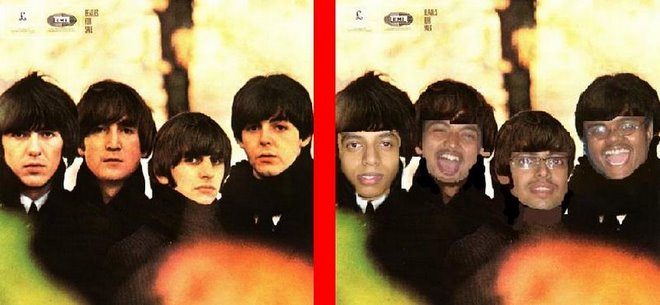 |
| The Universe (as perceived by God (translated to the 'language' of human perception)) |
I saw meaning and purpose fade away as the camera zoomed out; as the mass of strangers in the room swallowed the sense of unique belonging previously reserved for one's own. Moving up further, I remembered glimpses of Howrah Railway Station, as a sea of humanity flowed through, unceasingly for hours on end. En masse, how can identity persist? And without identity, how do we differentiate between a sea of (wo)men, and say an army of ants. Zooming out further, what purpose do the distinctions between plant and animal serve? The food chain? The earth is a closed system, and thus might as well be a macro-composite-organism, with all 'life forms' internal organs/ sub-systems. Either way we look at it, the moment we step into space, the limits of our world hit us (pale blue dot, for instance). Zoom out further... and you get the picture. Identity, meaning, value, association... everything stems from a subjective perception, which must necessarily be incomplete (E.g. in the absence of a knowledge of every single village-town in Kerala, my ancestral village seems distinct/ special, simply because it is where I come from and it is known to me. However, if I knew every square inch of Kerala/ India/ the world like the palm of my hand, then I might perceive things more like an endless stream of life/ being/ existence).
God, who/ which by definition is omniscient, must therefore be able to view/ perceive all things for what they are, equally. For all things are connected, in a causal network of related and (relatively) unrelated relationships. What better (human) visualization/ approximation of God's view of the universe then, than the symbol of absolute randomness (to mortals ill-equipped to make sense of it)? What more intuitive perception of God's workings then, than the unerring, unseeing, un-willing laws of the universe... than the universe itself?
Parting note:
Even with the dissolution of purpose and significance, this does not necessarily point us to fatalism/ nihilism. For the fact remains:
1. We are not God, to be able to absorb the universe as a mass of random noise
2. Thus, what we see, hear, feel, believe, do... becomes significant in our limited frame of reference
3. And, as this video so beautifully points out, meaning is what we assign to things
4. Thus our pursuit of happiness/ purpose can be worth our effort... and can be worth stretching the limits of our minuscule spheres of influence.
5. However, a less human/ anthropomorphous perspective of 'God' might help us better appreciate the little that we are, and also the lot that we share in common with others, on Carl Sagan's (and yours and mine!) pale blue dot.
PS:
“I believe in Spinoza's God, who reveals Himself in the lawful harmony of the world, not in a God who concerns Himself with the fate and the doings of mankind." - Albert Einstein

